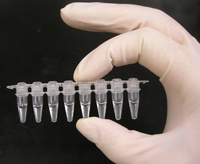
Photo from wikipedia
Evolutionary adaptations of prokaryotes to the environment sometimes result in genome reduction. Our knowledge of this phenomenon among free-living bacteria remains scarce. We address the dynamics and limits of genome… Click to show full abstract
Evolutionary adaptations of prokaryotes to the environment sometimes result in genome reduction. Our knowledge of this phenomenon among free-living bacteria remains scarce. We address the dynamics and limits of genome reduction by examining one of the most abundant bacteria in the ocean, the SAR86 clade. Despite its abundance, comparative genomics has been limited by the absence of pure cultures and the poor representation in metagenome-assembled genomes. We co-assembled multiple previously available single-amplified genomes to obtain the first complete genomes from members of the four families. All families showed a convergent evolutionary trajectory with characteristic features of streamlined genomes, most pronounced in the TMED112 family. This family has a genome size of ca. 1 Mb and only 1 bp as median intergenic distance, exceeding values found in other abundant microbes such as SAR11, OM43 and Prochlorococcus. This genomic simplification led to a reduction in the biosynthesis of essential molecules, DNA repair-related genes, and the ability to sense and respond to environmental factors which could suggest an evolutionary dependence on other co-occurring microbes for survival (Black Queen hypothesis). Therefore, these reconstructed genomes within the SAR86 clade provide new insights into the limits of genome reduction in free-living marine bacteria. Despite their ecological and evolutionary importance, streamlined microbes are poorly represented by metagenome-assembled genomes. Single-cell genomics has been proven to be an efficient alternative to recover all this hidden genomic diversity, revealing the high prevalence of lineages subjected to genome size reduction in nutrient-limited conditions of the ocean. Although the major limitation of single-amplified genomes is their incompleteness, we show that it is possible to reconstitute high-quality complete composite genomes (including the flexible genome). Comparative genomics using the first closed genomes within the SAR86 clade group showed different degrees of genome reduction, including the most streamlined microbe inhabiting the epipelagic zone of the ocean discovered so far. This feature makes the SAR86 clade an ideal candidate to investigate the evolutionary drivers that foster the selection of streamlined genomes in natural populations of closely related microbes that share the same environmental niche. This article is protected by copyright. All rights reserved.
Journal Title: Environmental microbiology
Year Published: 2023
Link to full text (if available)
Share on Social Media: Sign Up to like & get
recommendations!